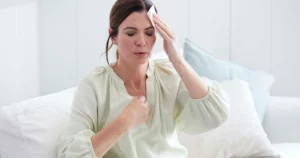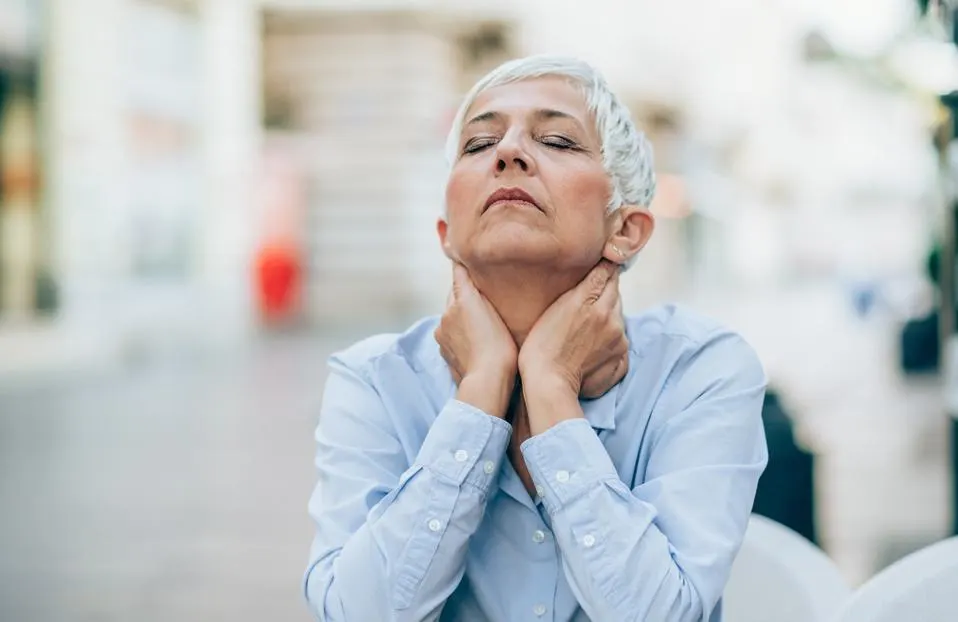Welcome to a comprehensive exploration of non-hormonal therapies designed to bring relief to those experiencing vasomotor symptoms. These symptoms, often associated with menopause, can include hot flashes, night sweats, and mood swings. While hormonal therapies are commonly discussed, this blog aims to shed light on alternative approaches that prioritize natural and non-pharmaceutical solutions. Whether you’re seeking an alternative due to medical reasons, personal preference, or simply exploring all options, this guide will help you navigate the diverse landscape of non-hormonal therapy for vasomotor symptoms.
Contents
What Are Vasomotor Symptoms?
 Vasomotor symptoms refer to a group of physiological responses that are associated with the constriction or dilation of blood vessels. These symptoms are commonly experienced during hormonal fluctuations, particularly in women during menopause, but they can also occur due to other factors. The most notable vasomotor symptoms include:
Vasomotor symptoms refer to a group of physiological responses that are associated with the constriction or dilation of blood vessels. These symptoms are commonly experienced during hormonal fluctuations, particularly in women during menopause, but they can also occur due to other factors. The most notable vasomotor symptoms include:
- Hot Flashes: Hot flashes are sudden sensations of intense warmth, often accompanied by flushing of the face and neck. These episodes can last for a few seconds to several minutes and are commonly associated with menopause. They may also be triggered by certain medications, medical conditions, or lifestyle factors.
- Night Sweats: Night sweats are episodes of excessive sweating during sleep, often leading to damp or soaked bedclothes. Similar to hot flashes, night sweats are frequently linked to hormonal changes during menopause, but they can also result from other medical conditions or medications.
- Flushing: Flushing involves the sudden reddening or warming of the skin, typically on the face and neck. It is a visible manifestation of the dilation of blood vessels near the skin’s surface. While it is commonly associated with menopause, flushing can also be caused by emotional stress, certain foods or drinks, and medical conditions.
Vasomotor symptoms are primarily attributed to changes in hormone levels. Particularly a decrease in estrogen during menopause. However, they can also be influenced by other factors such as stress, anxiety, certain medications, spicy foods, alcohol, and caffeine. If you are experiencing persistent or severe vasomotor symptoms, it is advisable to consult with a healthcare professional.
What Are Some Non-Hormonal Therapy For Vasomotor Symptoms?
Non-hormonal therapy for vasomotor symptoms aims to provide relief from symptoms like hot flashes, night sweats, and flushing, often associated with menopause. Here are some non-hormonal approaches that individuals may consider:
Lifestyle Modifications
Modifying one’s diet can play a crucial role in managing vasomotor symptoms. Certain foods and beverages, such as spicy foods, caffeine, and alcohol, have been known to trigger hot flashes and exacerbate symptoms. On the other hand, incorporating more plant-based foods, whole grains, and lean proteins may contribute to overall well-being and help alleviate symptoms.
Engaging in regular physical activity has shown promising results in reducing the frequency and severity of vasomotor symptoms. Exercise not only improves overall cardiovascular health but also helps regulate hormonal balance and manage stress, contributing to a potential decrease in the occurrence of hot flashes. Whether it’s aerobic exercises, strength training, or activities like yoga, finding a routine is essential.
Mind-Body Techniques
Mindfulness practices, including meditation, focus on being present in the moment and cultivating awareness. Research suggests that mindfulness meditation can reduce stress and anxiety, leading to a positive impact on vasomotor symptoms. Integrating mindfulness into daily life through guided meditation or mindfulness-based stress reduction programs may offer a non-pharmaceutical approach to symptom relief.
Yoga combines physical postures, breathing exercises, and meditation, offering a holistic approach to managing vasomotor symptoms. The practice of yoga has been associated with improved sleep, reduced stress, and enhanced overall well-being. Specific yoga poses and breathing techniques may be particularly beneficial for women experiencing hot flashes and night sweats.
Herbal Remedies
 Black cohosh, derived from the roots of the North American plant, has been investigated for its potential to alleviate hot flashes. While some studies suggest a positive effect, it’s crucial to approach herbal remedies with caution. Consulting with a healthcare professional is essential before incorporating black cohosh or any herbal supplement, as interactions with medications and individual responses can vary.
Black cohosh, derived from the roots of the North American plant, has been investigated for its potential to alleviate hot flashes. While some studies suggest a positive effect, it’s crucial to approach herbal remedies with caution. Consulting with a healthcare professional is essential before incorporating black cohosh or any herbal supplement, as interactions with medications and individual responses can vary.
Foods rich in phytoestrogens, such as soy and flaxseed, may offer a natural approach to hormone balance. These plant compounds, which have estrogen-like properties, may help regulate hormonal fluctuations associated with vasomotor symptoms. Including soy products and flaxseed in the diet may be considered.
Acupuncture
Acupuncture, a key component of TCM, involves inserting thin needles into specific points on the body to stimulate energy flow. Some women find relief from vasomotor symptoms through acupuncture sessions. While the mechanism of action is not fully understood, acupuncture is believed to influence the body’s energy balance. Exploring acupuncture as a complementary therapy may provide a non-pharmacological option for managing symptoms, but individual responses can vary, and consultation with a qualified practitioner is advisable.
Cooling Strategies
Creating a comfortable sleep environment is crucial for managing night sweats. Opting for moisture-wicking fabrics in bedding and sleepwear helps regulate body temperature and minimize discomfort. Breathable materials such as cotton and bamboo can enhance airflow, promoting a cooler and more restful sleep.
Adjusting room temperature and utilizing fans can be effective in reducing the intensity of hot flashes, especially during sleep. Keeping the bedroom cool promotes better sleep quality and can alleviate the disruption caused by night sweats. Experimenting with different cooling techniques, such as using a fan or air conditioning, allows individuals to identify what works best for their unique needs.
Behavioral Therapies
CBT techniques focus on identifying and modifying negative thought patterns and behaviors, making it a valuable tool for managing stress and anxiety. Given that stress can exacerbate vasomotor symptoms, CBT may contribute to symptom reduction. Learning coping strategies, relaxation techniques, and stress-management skills through CBT can empower individuals to navigate the challenges associated with vasomotor symptoms more effectively.
Phytoestrogens
Phytoestrogens are naturally occurring compounds found in certain plants that have estrogen-like effects. Incorporating foods rich in phytoestrogens, such as legumes, soy products, and whole grains, into the diet may offer a dietary approach to hormonal balance. These foods can be included as part of a well-rounded and diverse diet, providing a potential source of relief from vasomotor symptoms. However, moderation and individual tolerance should be considered.
Vitamin E
Some studies suggest that vitamin E supplementation may be associated with a reduction in the frequency and severity of hot flashes. Vitamin E, known for its antioxidant properties, may have a protective effect against oxidative stress. This is believed to contribute to vasomotor symptoms. However, it’s crucial to consult with a healthcare professional before adding vitamin E supplements to the routine, as excessive intake can have adverse effects.
It’s essential to remember that individual responses to these non-hormonal therapies can vary, and what works for one person may not work for another. Before starting any new treatment, it’s advisable to consult with a healthcare professional to ensure that the chosen approach is safe and appropriate for your specific situation.
What Are The Benefits Of Choosing Non-Hormonal Therapy?
 Choosing non-hormonal therapy for vasomotor symptoms offers several benefits, providing individuals with alternative approaches that may be suitable for various reasons. Here are some of the advantages:
Choosing non-hormonal therapy for vasomotor symptoms offers several benefits, providing individuals with alternative approaches that may be suitable for various reasons. Here are some of the advantages:
Avoidance of Hormonal Side Effects
One of the primary benefits of non-hormonal therapy is the avoidance of potential side effects associated with hormonal treatments. Some individuals may be at an increased risk of developing complications or may have pre-existing conditions that limit their ability to use hormonal therapies safely.
Suitability for Certain Medical Conditions
Non-hormonal therapies are often considered safer for individuals with specific medical conditions or a history of certain diseases. For example, women with a history of breast cancer or other hormone-sensitive conditions may opt for non-hormonal alternatives to manage vasomotor symptoms without concerns about hormonal treatments potentially influencing disease progression.
Individualized and Holistic Approach
Non-hormonal therapies often embrace a holistic and individualized approach to symptom management. Lifestyle modifications, mind-body techniques, and herbal remedies take into account the unique needs and preferences of each individual, promoting a more personalized and comprehensive strategy for well-being.
Reduced Risk of Hormonal-related Cancers
Some individuals may choose non-hormonal therapies to reduce their overall exposure to hormones and minimize the potential risk of hormone-related cancers, such as breast and uterine cancers. Non-hormonal approaches provide an alternative path for managing symptoms without influencing hormone levels.
Flexibility and Choice
Non-hormonal therapies offer individuals a range of options to choose from, allowing them to tailor their approach based on personal preferences and lifestyle. This flexibility empowers individuals to explore different strategies and find the combination of non-hormonal therapies that works best for them.
Broader Scope of Symptom Management
Non-hormonal therapies address not only vasomotor symptoms but also contribute to overall health and well-being. Lifestyle modifications, such as regular exercise and a balanced diet, can have positive effects on various aspects of health beyond symptom relief.
It’s important to note that the choice between hormonal and non-hormonal therapies is highly individual, and what works for one person may not work for another. The decision should be made in consultation with a healthcare professional who can assess individual health factors. Thus, guide the most suitable approach for managing vasomotor symptoms based on an individual’s unique circumstances and preferences.
Conclusion
In conclusion, embracing non-hormonal therapy for vasomotor symptoms offers a diverse and personalized approach to finding relief. From making simple lifestyle adjustments and practicing mind-body techniques to exploring herbal remedies and cooling strategies, individuals have a range of options to choose from. Opting for non-hormonal therapies allows for flexibility, empowering individuals to manage symptoms while avoiding potential side effects associated with hormonal treatments.
Remember, the journey toward relief is unique for each person. Hence, consulting with a healthcare professional can guide the way to the most suitable and effective non-hormonal therapies tailored to individual needs. If you are facing menopause-related issues, menopause treatment at HerMantra can help. Book your free trial online menopause treatment session now.


